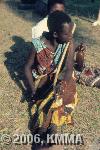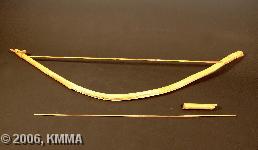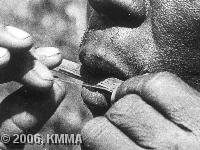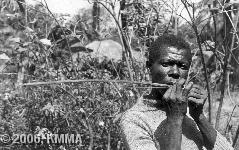




The mouth bow is the simplest stringed instrument, named so because it indeed takes the form of a small bow upon which a string made of fibre or reed is stretched. The string measures between 50 and 70 cms, the bow between 80 and 130 cms. To play it, one end of the string is held between the musician’s lips, while it is plucked by the musician or struck with a thin twig. In this way the mouth works as a sound box. By expanding or contracting the oral cavity and by slightly opening the lips, harmonics can be created. Using another stick the player can damp the string, thus shortening it and producing a higher tone. In this way two fundamentals can be produced. Mention is also made of instruments where the string is divided into two using a small rope tightened between bow and string, as is often the case with the musical bow.
Another playing technique consists of positioning the bow against the lips. In this case the string is plucked by hand and only one tone can be produced. While it is being played, the instrument is always held horizontally, in contrast to the musical bow (to which it is related) that is always held vertically.
In some tribes, such as the Nkundo, a hunting bow is effectively used as a mouth bow. Both the mouth bow and the musical bow are played primarily to enhance everyday stories and events.
This type of instrument is used in recordings of our sound archives made with the Congolese peoples mentioned hereafter where it appears with the following vernacular names:
Belumu (Pygmées), Bou (Efe), Dweme (Boma), Ekibulenge (Nande), Kadad (Lunda), Kitingbi (Efe), Lakwemi (Kuba), Lingungu (Lega), Lokombi (Bampe), Lokombi (Longombe) (Ekonda), Lokombi (Ngombi) (Badia, Sengele), Lokoombi (Boyela), Longofi (Mangbetu), Longombe (Bolia, Mongo), Longombi (Mongo), Lukungu (Luba, Pende), Lungungu (Kwese), Lunkombe (Luba-Kasai), Luntanta (Kanyoka), Lunzenze (Chokwe, Tshokwe), Lusuba (Luba), Mbela (Ngbaka), Mutefu (Luba-Kasai, Songye), Mutevu (lusuba) (Luba), Nedungu (Mangbetu), Nelingoti (Mangbetu), Ngomi (Boma), Nguem (Teke), Nkutu Kubidi (Luba), Nzenze (Shi), Rukung (Lunda), Umuduri (Rwanda), Zeze ((Wa) Nande)
Bibliography:
Discography:
© KMMA